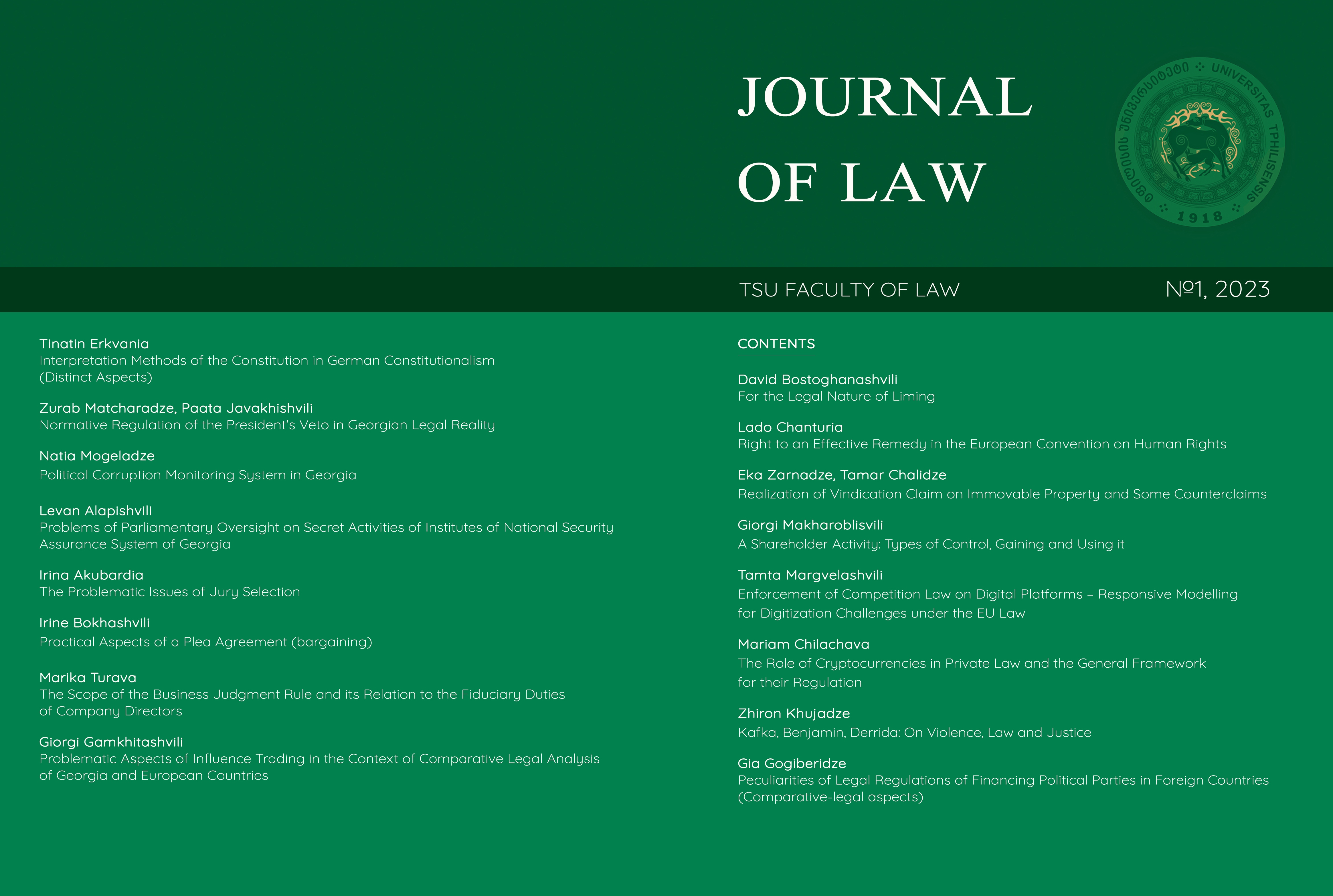Problematic Aspects of Influence Trading in the Context of ComparativeLegal Analysis of Georgia and European countries
DOI:
https://doi.org/10.60131/jlaw.1.2023.7074Keywords:
Officiary, Passive influence, Active influence, Official authority, Lobbying.Abstract
The present article article examines the legal aspects of influence trading in light of the analysis of the "Criminal Law Convention on Corruption" of the Council of Europe and the legislation of several European countries. In this respect, the article analyzes the main legal framework of the act of influence peddling as defined in the Council of Europe Convention, the legal extent of its action, and the significance of its implementation in the national criminal law of each state. Thus, in this regard, the article analyzes in depth the key aspects of the trade institution under the influence of Georgia, Spain, France, Belgium, and Hungary, as well as the questions of their conformity with the Council of Europe Convention. Furthermore, in terms of comparative legal analysis, the differentiating legal characteristics of the trade institution under the impact of Georgia and the aforementioned European nations are explored.
Influence peddling, as a form of lever for exerting undue influence on officials through personal relationships, provides a corrupt background to the extent that this behavior undermines the reputation of state institutions and the degree of trust in them in the eyes of citizens. Influence peddling is comparable to lobbying in terms of exerting influence on government officials, which is why several European nations have declined to criminalize it. Hence, the concept of interaction between influence trading and lobbying organizations is extensively investigated. Ultimately, the key legal features of influence trading were analyzed in terms of comparative legal and systematic analysis, and a clear boundary was made between the aforementioned institution and other associated legal activities such as lobbying, legal or other services, and other consulting activities.
References
Penal Code of France, 22/07/1992, https://sherloc.unodc.org/cld/uploads/res/document/french_penal_code_html/french_penal_code.pdf [20. 12. 2023].
Criminal Code of Spain, 23/11/1995, https://www.mjusticia.gob.es/es/AreaTematica/DocumentacionPublicaciones/Documents/Criminal_Code_2016.pdf [10.12. 2023].
"Criminal Law Convention on Corruption" of the Council of Europe, Strasbourg, 27/01/1999.
Criminal Code of Hungary, 25/06/2012, https://sherloc.unodc.org/cld/uploads/res/document/hun/2013/hungary_criminal_code_2012_html/Hungary_Criminal_Code.pdf [29/12/2023].
Gamkhitashvili G., Problematic Aspects of the Separation of Bribery and Influence Peddling, Law Herald Journal, No. 4, 2021, 130-135 (In Georgian).
Gogiberidze G., Doctoral Thesis on the topic: Lobbying and Legal Aspects of its Regulation, Tbilisi, 2012, 66 (In Georgian).
Hollan M., Trading in Influence: Requirements of the Counsil of Europe Convention and the Hungarian Criminal Law. Acta Juridica Hungarica, 52, #3, 2011, 244-245.
Lekveishvili M., Mamulashvili G., Todua N., Private Part of Criminal Law, Book II, 7th ed., 2020, 410, 413 (In Georgian).
Philipp J., The Criminalisation of Trading in Influence in International Anti-Corruption Laws. University of the Western Cape, 2009, 35-36, 39, 40, 43-44 48.
Slingerland W., Trading in Influence: Corruption Revizited. Saxion University, 2010, 3-4, https://www.law.kuleuven.be/integriteit/egpa/egpa2010/slingerland_trading-in-influence.pdf [28.12. 2023].
https://www.mjusticia.gob.es/es/AreaTematica/DocumentacionPublicaciones/Documents/Criminal_Code_2016.pdf [10.12. 2023].
Downloads
Published
How to Cite
Issue
Section
License

This work is licensed under a Creative Commons Attribution-ShareAlike 4.0 International License.









